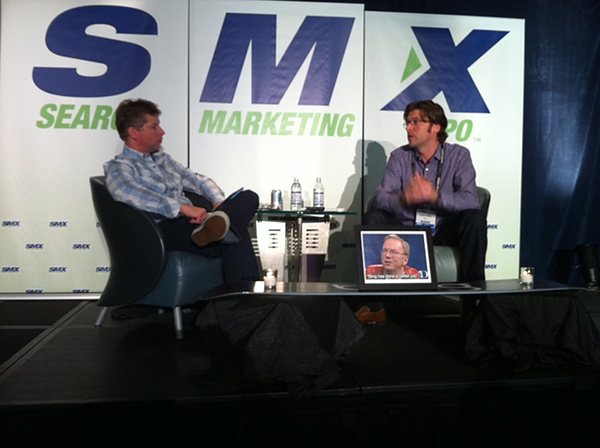SMX Advanced Liveblog: Social Data & Search With Bing’s Stefan Weitz
Day two of our SMX Advanced conference is set to begin shortly with a keynote session on the “Confluence of Social Data & Search.” Bing Director Stefan Weitz is due to give a presentation/demo and then chat with Danny Sullivan. With 10 minutes to go before we start, I see no evidence of pandas on […]
Day two of our SMX Advanced conference is set to begin shortly with a keynote session on the “Confluence of Social Data & Search.” Bing Director Stefan Weitz is due to give a presentation/demo and then chat with Danny Sullivan.
With 10 minutes to go before we start, I see no evidence of pandas on the stage … but there is some kind of covered podium/thing that looks mysterious (and a bit creepy, if I’m being honest, like a person is about to jump out from under the black covering).
Stay tuned and we’ll be back soon with coverage from today’s keynote.
We’re back and we’re underway. Stefan is previewing his talk, which will apparently be more than just about social.
First up, “Honey Badger” — an internal name for the new release of Bing webmaster tools. Honey badger is fierce and very focused and has a singular objective, to eat honey. That describes our webmaster tools — focused on providing tools for webmasters. But our team cares (unlike the honey badger). What’s new:
Crawl setting management: tell Bing when to crawl
Role management: give different people different access levels
Toolbox site update: new videos, data, how-to info and such
This ships today.
Second, Schema.org. Web is no longer collection of documents, it’s a proxy for the physical. Things are described in ridiculous detail on the web, but the data is scattered across many places. As search engines, we have to do more to gather the data and attempt to re-assemble the details into something clear.
People aren’t just trying to find stuff, they’re trying to do stuff. The challenge in search to expose all the new services that let you do things online. Despite the fact we get tons of feeds, the data is still problematic. Example: duplicate movie titles on IMDB, Netflix and similar sites.
The unstructured web is very messy. Schema.org allows publishers to markup objects on the page. That’s why it’s important.
Third topic … social and search. Bing’s goal is to provide decision tools for the real world. The “decision engine” idea. Decisions aren’t just about logic — emotion plays a big part. We rely on recommendations from friends.
Data overload is a problem. Every search has 4.8 billion results. How do you process and make decisions when you have so many choices? Well … people are leaving traces everywhere: billions of tweets, YouTube videos, blog posts and more. These traces aren’t locked away anymore. Systems can learn the relationships and process the data.
But how do humans tap into all this data? Go to a social network? Go to a forum or Q&A site? Bing: Can search make this easier?
Bing’s social focus:
1. Trusted friends – how to bring their opinions into search
2. Collective IQ – better search using the collective, the wisdom of the crowd
3. Enabling conversation – find the expert; move search from passive to active (Shopping, Travel, People Finder)
Social is important. But it’s one piece of search quality.
Stefan wraps up his presentation that way and now Danny is going to ask some questions.
Danny begins by unveiling what’s under the black coverage: a Bing snowboard! He also gives Stefan a framed photo of Google Executive Chairman Eric Schmidt with his quote added underneath, “Bing has done a better job.” That’s a reference to the recent D9 Conference.
Danny asked about how Bing scales/manages its answers/decisions. Stefan says they’re trying to improve the automation and scalability, but there are also manual things like providing answers for “who won the Oscars?” and such.
DS: Asks about Bing-Facebook relationship.
SW: Originally, Bing was about data and knowledge and tools. Things like Farecast for travel searches. But we know people are looking to their networks to help with decisions. The social aspect rounds out our decision engine position. We use data, but we also use our buddies.
Stefan tells a story about his mom searching on Bing to research a new laptop, and she saw one of his Facebook likes in the search results.
DS: Asks about Bing using Facebook, but Google not having that data and relying more on Twitter.
SW: We also have Twitter. Twitter is amazing, especially for breaking news. We’re embedding Twitter data in the news search page. I think it’s going to be tough for Google to competitive in social/search without Facebook. We think the Facebook graph is a key to making this real.
DS: Asks about the level of data they get from Facebook.
SW: We get the full firehose. We know basic relationship info, but I don’t think we get the really deep data about that.
DS: (audience question) Bing webmaster tools uses Silverlight. That’s a drag.
SW: We’re working on that.
DS: (audience questions) Doesn’t use of social signals conflict with privacy issues.
SW: We follow all of the privacy decisions you make in your Facebook account. We know we have to be very careful with that data.
And after a quick joke about Microsoft (not) giving out free Xboxes to the entire audience, we are done. Thanks for reading!
Contributing authors are invited to create content for Search Engine Land and are chosen for their expertise and contribution to the search community. Our contributors work under the oversight of the editorial staff and contributions are checked for quality and relevance to our readers. The opinions they express are their own.
Related stories
New on Search Engine Land

